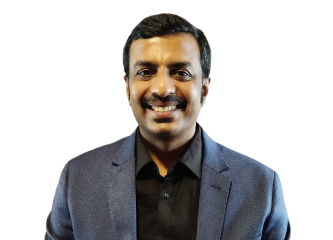About the Speaker

Dr. Krishna Kumar Venkitachalam
Innovation Officer at Enago
Dr. KK is an orthopedic surgeon by qualification with 15+ years of experience in academic publishing under various roles, including manuscript editing, manuscript writing, editor training, author education, language technology solutions, and innovation. As an editor/writer, he has helped hundreds of authors/researchers publish their research in leading journals worldwide. Being passionate about science communication and teaching, he has conducted several interactive training programs and author workshops. These included touring workshops in India and internationally along with online workshops in collaboration with universities and publishers. With his background in academia, experience in science communication experience, and affinity towards technological solutions, he plays a role as a consultant in integration of new technologies to publishing platforms and for designing customized publication solutions for institutions and publishers.
Session Agenda
In pursuit of academic excellence and scholarly success, Enago is glad to announce a workshop series designed to empower the researchers of Chulalongkorn University with crucial skills for thriving in today’s academic landscape.
1. How to Draft a Million Dollar Grant
Research and funding go hand in hand, and the ability to attain funding is a real necessity and a valuable skill for a successful career in academia. Competition for grants and fellowships is intensifying and it is important for researchers to not only recognize a good call for applications that matches their profile and requirements but also write an excellent research proposal. This session aims to educate researchers about the process of creating a persuasive and compelling proposal for grant funding. Researchers will have a better understanding of the following:
- How to choose between a grant and a fellowship
- How to identify the different funding bodies and their interests
- How to plan and select the most fitting call for applications
- How to write a research proposal
- Understanding the steps involved in pre- and post-submission
2. How to Use AI Tools to Improve Your Academic Writing: Best practices to follow
AI has already transformed the world of academic discourse. From refining academic text to generating novel research ideas, AI has become a powerful ally for researchers and authors, promising increased productivity and efficiency. However, effectively leveraging AI requires following certain best practices. With this session, researchers will gain valuable insights into the following:
- AI’s rising role in academic writing workflows
- Recommended AI applications for research and writing
- Benefits of AI tools and related challenges
- Best practices for using AI tools in academic writing
- Concerns related to AI tools and their responsible applications
3. How to Master the Art of Publishing in Social Sciences and Humanities
In this session, we will discuss the key publishing aspects and effective strategies for successful publications in Social Sciences and Humanities disciplines. We will discuss the submission requirements, cover letter essentials, and finally share insights on manuscript decisions and the peer review process. Researchers will have a better understanding of the following:
- How to get started with your research study
- How to structure a research paper
- How to choose the right journal
- Open access publishing in Social Sciences and Humanities
- Manuscript submission process
- Insights into manuscript decisions




 April 22, 2024
April 22, 2024
